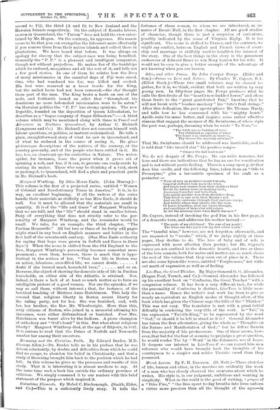Margaret Winthrop. By Alice Morse Earle. (John Murray.)— This volume
is the first of a projected series, entitled " Women of Colonial and Revolutionary Times in America." It is, in its way, an excellent beginning. If all the writers of the series handle their materials as skilfully as has Miss Earle, it should do well. For it must be allowed that the materials are small in quantity. It is of the "life and times " of Margaret Winthrop that we are told, and the " life " should stand in smaller letters. Strip off everything that does not strictly refer to the per- sonality of Margaret Winthrop, and the remainder would be small. We take, for an example, the third chapter, "The Puritan Housewife." All but two or three of its forty odd pages might stand in any book on English manners and habits in the first half of the seventeenth century. (Has Miss Earle authority for saying that hops were grown in Suffolk and Essex in those days ?) When the scene is shifted from the Old England to the New, Margaret Winthrop's personality becomes somewhat more prominent ; even then, however, there is much that is hypo- thetical in the notices of her. " That her life in Boston was
an active, laborious, over-filled life, we cannot doubt doubt if she brewed much household beer," and so on. However, the object of showing the domestic side of life in Puritan households, on either side of the Atlantic, is attained. Nor, indeed, is there a lack of at least so much matter as to form an intelligible picture of a good woman. Nor are the episodes, if we may so call them, without interest ; that, for instance, of the heretical teaching of Mistress Anne Hutchinson. This lady dis- covered that religious liberty in Boston meant liberty for the ruling party, not for her. She was banished, and, with her, her brother, the Rev. Mr. Wheelwright. More than this, sixty citizens of Boston, who joined in a memorial affirming his innocence, were either disfranchised or banished. Poor Mrs. Hutchinson was burnt alive by the Indians. A pious champion of orthodoxy saw "God's hand" in this. But what about religious liberty? Margaret Winthrop died, at the age of fifty-six, in 1047. It is curious to read that the Dukes of Norfolk and Newcastle number her among their ancestors.


















































 Previous page
Previous page